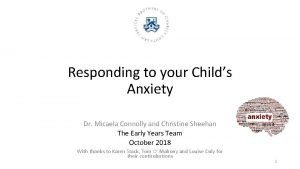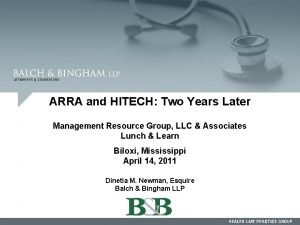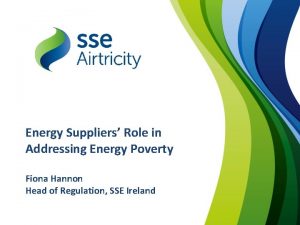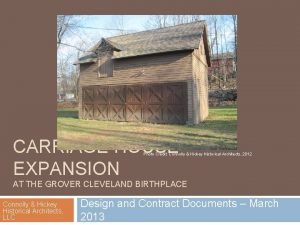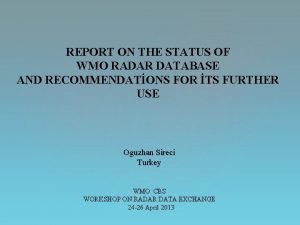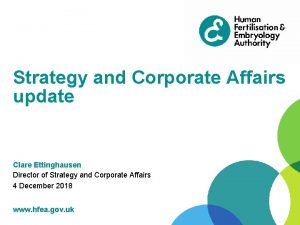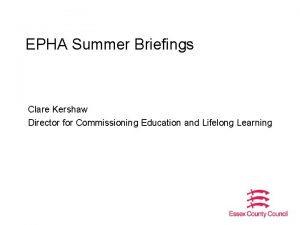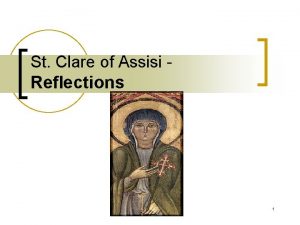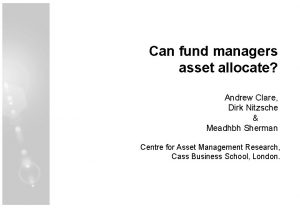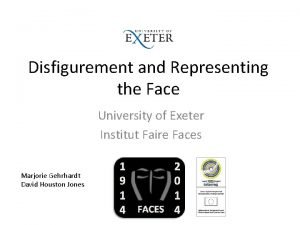Andrew Connolly CFO University of Exeter Clare Partridge




























- Slides: 28

Andrew Connolly CFO, University of Exeter Clare Partridge Partner, KPMG

Financial Reporting: governance Financial Reporting Council UK accounting and auditing standard setter FE and HE Statement of Recommended Practice Board FEHE SORP Board, recognised SORP making body (1 of 7) BUFDG Financial Reporting Group SORP Board technical working party SORP 2015 development partner

Financial Reporting: governance Regulators also issue Accounts Directions • Require compliance with the SORP • Require various additional disclosures in Financial Statements

Change of Accounting Code • Old UK GAAP withdrawn FRS 1 to 30, over 2, 000 pages + FEHE SORP 2007 • New UK GAAP FRS 102, only 226 pages + FEHE SORP 2015 • Based on International Financial Reporting Standards (IFRS)

Change of Accounting Code • FRS 102 applies to non-listed entities (Ltd, LLP) • Applies to Charities and Housing Associations, both have their own SORPs • Applies to 2015/16 for first time in HE • Requires a re-statement of 2014/15 comparatives

Change of Accounting Code: impact • Some income/expenditure, asset/liability recognition changes how they are reported in financial statements • New accounting policy choices but we’ve always had accounting policy choices • Some presentation/classification changes …. . choice, interpretation, different views, different outcomes

Illustrating the New Numbers Financial Performance • Total Income • Surplus for the Year • Operating Cash Inflow

Illustrating the New Numbers Financial Performance Financial Position • Total Income • I&E Unrestricted Reserves • Surplus for the Year • Net Assets • Operating Cash Inflow

Illustrating the New Numbers With 5 universities and 3 different audit firms

Illustrating the New Numbers Compare the 2014/15 published financial results with the re-stated 2014/15 results that are shown in the soon to be published 2015/16 financial statements to illustrate the impact of changes to accounting standards……

Total Income 2014/15 Source: 2014/15 financial statements, 2015/16 900 financial statements (2014/15 re-stated)Old GAAP 800 New UKGAAP £ millions 700 600 500 400 300 200 100 0 Edinburgh +£ 6 m +1% Exeter +£ 21 m +6% Leeds -2% -£ 13 m Manchester Metropolitan +£ 7 m +3% Swansea +£ 7 m +3%

Income Why would income change? Edinburgh income accruals +£ 32 m +9% +£ 6 m Exeter +£ 21 m Leeds -£ 13 m Manchester Met +£ 7 m Swansea +£ 7 m

Income Why would income change? Edinburgh Exeter +£ 21 m Leeds -£ 13 m Manchester Met +£ 7 m Swansea +£ 7 m • Govt capital grants (new policy choice) accrual v performance model choice • Non-Govt capital grants (accounting change) previously deferred and released back to I&E over time +£ 32 m +9% +£ 6 m

Income Why would income change? Edinburgh Exeter +£ 21 m Leeds -£ 13 m Manchester Met +£ 7 m Swansea +£ 7 m • Service concessions (first time recognition) eg former “off-balance sheet” student residences • New endowments (accounting change) formerly credited to the STRGL, now credited to I&E • Local pension schemes (accounting change) No longer account for return on pension assets +£ 32 m +9% +£ 6 m

Net Surplus 2014/15 Source: 2014/15 financial statements, 2015/16 60 financial statements (2014/15 re-stated)Old GAAP New UKGAAP £ millions 50 40 30 20 10 0 Edinburgh +£ 3 m Exeter -£ 10 m Leeds -£ 45 m Manchester Metropolitan -£ 5 m Swansea -£ 15 m

Net Surplus Why would the surplus change? Edinburgh +£ 3 m Exeter -£ 10 m Leeds -£ 45 m Manchester Met Swansea Old Income statement STRGL New -£ 5 m -£ 15 m Total comprehensive income

Net Surplus Why would the surplus change? • Pensions! (first-time recognition) Edinburgh +£ 3 m Exeter -£ 10 m Leeds -£ 45 m Manchester Met Swansea -£ 5 m -£ 15 m 1) multi-employer deficit recovery plans =USS, SAUL 2) In July 2015 a new deficit recovery plan was agreed resulting in a …. . material charge in 2014/15, this won’t repeat in 2015/16 • Pensions! (accounting change) measurement of finance charges in local schemes, such as LGPS

Net Surplus Why would the surplus change? • Pensions! (first-time recognition) Edinburgh +£ 3 m Exeter -£ 10 m Leeds -£ 45 m Manchester Met Swansea -£ 5 m -£ 15 m 1) multi-employer deficit recovery plans =USS, SAUL 2) In July 2015 a new deficit recovery plan was agreed resulting in a …. . material charge in 2014/15, this won’t repeat in 2015/16 • Pensions! (accounting change) measurement of finance charges in local schemes, such as LGPS • Capital grants (policy choice & accounting change) expect more volatility in surpluses • New endowments (accounting change) previously credited to the STRGL, now credited to I&E =volatility

Operating Cash Inflow 2014/15 Source: 2014/15 financial statements, 2015/16 60 financial statements (2014/15 re-stated)Old GAAP New UKGAAP £ millions 50 40 30 20 10 0 Edinburgh +£ 10 m Exeter +£ 18 m Leeds +£ 6 m Manchester Metropolitan +£ 1 m Swansea -£ 1 m

Op Cash Inflow Why would operating cashflow change? Edinburgh +£ 10 m Exeter +£ 18 m Leeds +£ 6 m Manchester Met +£ 1 m Swansea -£ 1 m • Service concessions (first-time recognition) former “off-balance sheet” transactions now “on-balance sheet” If an off-balance sheet transaction becomes on-balance sheet this results in first-time recognition of… Ø Ø Asset Liability (PV of future lease payments, matches the asset) Operating cash/ income Expense (service costs + depreciation + finance charges)

I&E Unrestricted Reserves 2014/15 Source: 2014/15 financial statements, 2015/16 800 financial statements (2014/15 re-stated)Old GAAP 700 New UKGAAP £ millions 600 500 400 300 200 100 0 Edinburgh +£ 331 m Exeter +£ 357 m Leeds +£ 274 m Manchester Metropolitan +£ 62 m Swansea +£ 27 m

I&E Reserves Why would I&E reserves change? • Capital grants (accounting policy choice) Edinburgh +£ 331 m Exeter +£ 357 m Leeds +£ 274 m Manchester Met +£ 62 m Swansea +£ 27 m reclassification of government deferred capital grant balances • Pensions (first time recognition) account for the USS/SAUL recovery plan liabilities for 1 st time • Revaluation reserves (accounting policy choice) adopt deemed cost > reclassify reserves • Financial instrument liabilities (first time recognition) typically interest-rate swaps used to fix interest costs

£ millions Net Assets 2014/15 Source: 2014/15 financial statements, 2015/16 2000 financial statements (2014/15 re-stated)Old GAAP 1800 1600 1400 1200 1000 800 600 400 200 0 New UKGAAP Edinburgh -£ 26 m Exeter -£ 68 m Leeds -£ 71 m Manchester Metropolitan -£ 31 m Swansea -£ 20 m

Net Assets Why would net assets change? Edinburgh -£ 26 m Exeter -£ 68 m Leeds -£ 71 m Manchester Met -£ 31 m Swansea -£ 20 m • Fixed asset valuations (accounting policy choice) some will raise historic cost asset values by a one-off revaluation, likely to be a material increase in asset values for some • Pensions (first time recognition) new USS/SAUL liabilities • Financial instrument liabilities (first time recognition) liabilities for debt hedging instruments – depends on financing policies. When (if? ) market rates rise, liabilities could flip to assets!

From 5 to 132: The English HE sector Financial Health of the Higher Education Sector, HEFCE November 2016 Annex B: Changes to 2014 -15 following FRS 102 conversion Based on HEI Forecasts, not audited results.

New Numbers: conclusion • More volatility in reporting surpluses • New liabilities recognised for first-time but some will revalue fixed assets to counteract • Liability valuations are sensitive to discount rates low discount rates=high present value of liabilities > pension deficit valuations > financial instrument liability valuations

New Numbers: conclusion • Different universities, different accounting policy choices – but nothing new there • Beware of headline numbers! • Read the narrative – CFOs/FDs should unpick the accounting noise and explain performance • Have accounting standard setters made it harder to understand what's going on? • How will regulators regulate?

New Numbers: conclusion Understand Mr Jelly to get to Mr Strong
 Clare partridge
Clare partridge Wendy robinson exeter
Wendy robinson exeter Micaela connolly
Micaela connolly Prashan patel grant thornton
Prashan patel grant thornton Fundamentals of web development randy connolly ppt
Fundamentals of web development randy connolly ppt Connolly recovery audit
Connolly recovery audit Connolly lodge buckingham street
Connolly lodge buckingham street Connolly & hickey historical architects
Connolly & hickey historical architects Coping cat fear ladder
Coping cat fear ladder Tcp sequence diagram
Tcp sequence diagram Deborah wolfe
Deborah wolfe Partridge in a pear tree
Partridge in a pear tree Sue partridge
Sue partridge Desco industries sanford nc
Desco industries sanford nc Richard mansell exeter
Richard mansell exeter Who discovered trigonometry
Who discovered trigonometry Info point exeter
Info point exeter Heathrow to penryn
Heathrow to penryn Exeter scholars year 12
Exeter scholars year 12 Feele
Feele Flexible combined honours
Flexible combined honours Feele
Feele Wmo radar database
Wmo radar database Exeter circular economy
Exeter circular economy Mary clare zak
Mary clare zak Clare ettinghausen
Clare ettinghausen Richard pattinson clare pattinson
Richard pattinson clare pattinson Clare kershaw
Clare kershaw Clare embling
Clare embling


